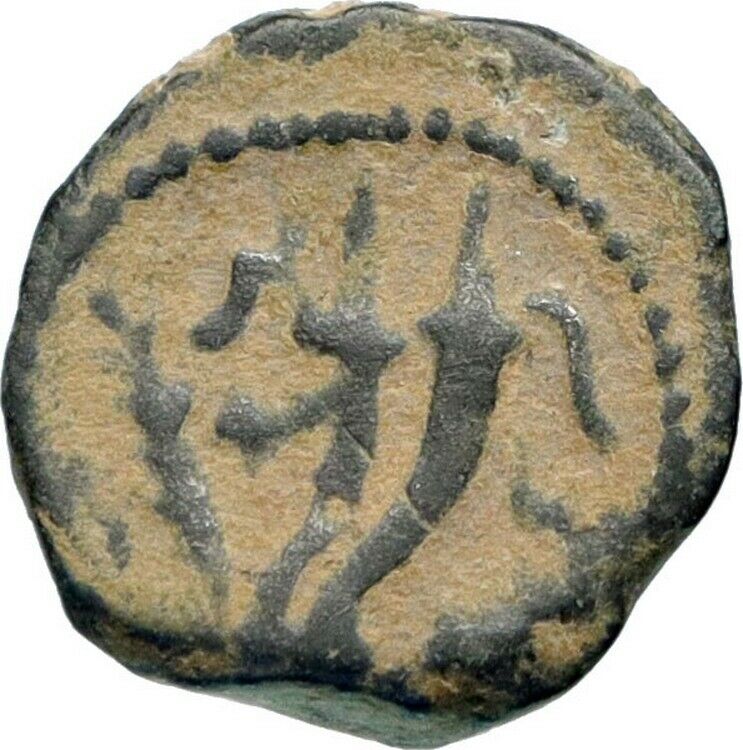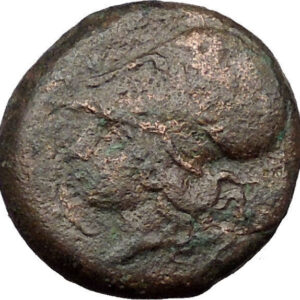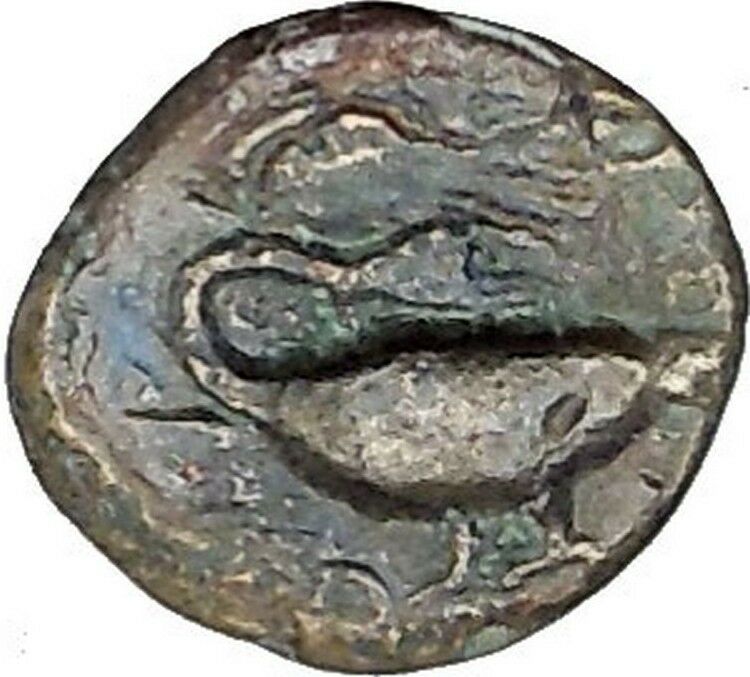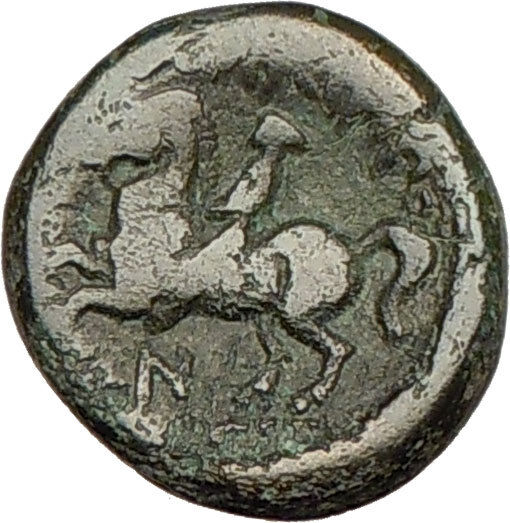|
Greek city of Tragilos in Macedonia
Bronze 14mm (2.36 grams) Struck circa 400 B.C.
Reference: Sear 1472 var.; HGC 3, 747; Cf. SNG ANS 907-12 (control)
Head of Hermes right, wearing petasos.
TPAIΛION, Rose; grain ear in field to right.
You are bidding on the exact item pictured, provided with a Certificate of Authenticity and Lifetime Guarantee of Authenticity.
 Hermes is the great messenger of the gods in Greek mythology and additionally as a guide to the Underworld. Hermes was born on Mount Cyllene in Arcadia. An Olympian god, he is also the patron of boundaries and of the travelers who cross them, of shepherds and cowherds, of the cunning of thieves and liars, of orators and wit, of literature and poets, of athletics and sports, of weights and measures, of invention, and of commerce in general. His symbols include the tortoise, the rooster, the winged sandals, the winged hat, and the caduceus (given to him by Apollo in exchange for the lyre). Hermes is the great messenger of the gods in Greek mythology and additionally as a guide to the Underworld. Hermes was born on Mount Cyllene in Arcadia. An Olympian god, he is also the patron of boundaries and of the travelers who cross them, of shepherds and cowherds, of the cunning of thieves and liars, of orators and wit, of literature and poets, of athletics and sports, of weights and measures, of invention, and of commerce in general. His symbols include the tortoise, the rooster, the winged sandals, the winged hat, and the caduceus (given to him by Apollo in exchange for the lyre).
Symbols of Hermes were the palm tree, turtle, rooster, goat, the number four, several kinds of fish, incense. Sacrifices involved honey, cakes, pigs, goats, and lambs.
In the Roman adaptation of the Greek religion (see interpretatio romana), Hermes was identified with the Roman god Mercury, who, though inherited from the Etruscans, developed many similar characteristics, such as being the patron of commerce.
The Homeric hymn to Hermes invokes him as the one “of many shifts (polytropos), blandly cunning, a robber, a cattle driver, a bringer of dreams, a watcher by night, a thief at the gates, one who was soon to show forth wonderful deeds among the deathless gods.”
He protects and takes care of all the travelers, miscreants, harlots, old crones and thieves that pray to him or cross his path. He is athletic and is always looking out for runners, or any athletes with injuries who need his help.
Hermes is a messenger from the gods to humans, sharing this role with Iris. An interpreter who bridges the boundaries with strangers is a hermeneus. Hermes gives us our word “hermeneutics”, the study and theory of interpretation. In Greek a lucky find was a hermaion. Hermes delivered messages from Olympus to the mortal world. He wears shoes with wings on them and uses them to fly freely between the mortal and immortal world. Hermes was the second youngest of the Olympian gods, being born before Dionysus.
Hermes, as an inventor of fire, is a parallel of the Titan, Prometheus. In addition to the lyre, Hermes was believed to have invented many types of racing and the sports of wrestling and boxing, and therefore was a patron of athletes.
According to prominent folklorist Yeleazar Meletinsky, Hermes is a deified trickster. Hermes also served as a psychopomp, or an escort for the dead to help them find their way to the afterlife (the Underworld in the Greek myths). In many Greek myths, Hermes was depicted as the only god besides Hades, Persephone, Hecate, and Thanatos who could enter and leave the Underworld without hindrance.
Hermes often helped travelers have a safe and easy journey. Many Greeks would sacrifice to Hermes before any trip.
In the fully-developed Olympian pantheon, Hermes was the son of Zeus and the Pleiade Maia, a daughter of the Titan Atlas. Hermes’ symbols were the cock and the tortoise, and he can be recognized by his purse or pouch, winged sandals, winged cap, and the herald’s staff, the kerykeion. The night he was born he slipped away from Maia and stole his elder brother Apollo
 Macedonia or Macedon was an ancient kingdom on the northern periphery of Classical Greece and later the dominant state of Hellenistic Greece. It was ruled during most of its existence initially by the legendary founding dynasty of the Argeads, the intermittent Antipatrids and finally the Antigonids. Home to the Macedonians, the earliest kingdom was centered on the northeastern part of the Greek peninsula, bordered by Epirus to the west, Paeonia to the north, the region of Thrace to the east and Thessaly to the south. Macedonia or Macedon was an ancient kingdom on the northern periphery of Classical Greece and later the dominant state of Hellenistic Greece. It was ruled during most of its existence initially by the legendary founding dynasty of the Argeads, the intermittent Antipatrids and finally the Antigonids. Home to the Macedonians, the earliest kingdom was centered on the northeastern part of the Greek peninsula, bordered by Epirus to the west, Paeonia to the north, the region of Thrace to the east and Thessaly to the south.
The rise of Macedon, from a small kingdom at the fringe of typical Greek city states affairs, to one which came to control the fate of the entire Hellenic world, occurred under the reign of Philip II. With the innovative Macedonian army, he defeated the old powers of Athens and Thebes in the decisive Battle of Chaeronea in 338 BC and subdued them, while keeping Sparta in check. His son Alexander the Great pursued his father’s effort to command the whole of Greece through the federation of Greek states, a feat he finally accomplished after destroying a revolting Thebes. Young Alexander was then ready to lead this force, as he aspired, in a large campaign against the Achaemenid Empire, in retaliation for the invasion of Greece in the 5th century BC.
In the ensuing wars of Alexander the Great, he was ultimately successful in conquering a territory that came to stretch as far as the Indus River. For a brief period his Macedonian Empire was the most powerful in the world, the definitive Hellenistic state, inaugurating the transition to this new period of Ancient Greek civilization. Greek arts and literature flourished in the new conquered lands and advancements in philosophy and science were spread to the ancient world. Of most importance were the contributions of Aristotle, a teacher to Alexander, whose teachings carried on many centuries past his death.
After the death of Alexander the Great in 323 BC, the following wars of the Diadochi and the partitioning of his short-lived empire, Macedonia proper carried on as a Greek cultural and political center in the Mediterranean region along with Ptolemaic Egypt, the Seleucid Empire, and the Attalid kingdom. Important cities like Pella, Pydna, and Amphipolis were involved in power struggles for control of the territory, and new cities were founded, like Thessalonica by the usurper Cassander, which is now the second largest city of modern day Greece. Macedonia’s decline of influence began with the rise of Rome until its ultimate subjection during the second Macedonian Wars.
 The Roman province of Macedonia (Latin: Provincia Macedoniae, Greek: Ἐπαρχία Μακεδονίας) was officially established in 146 BC, after the Roman general Quintus Caecilius Metellus defeated Andriscus of Macedon, the last self-styled King of the ancient kingdom of Macedonia in 148 BC, and after the four client republics (the “tetrarchy”) established by Rome in the region were dissolved. The province incorporated ancient Macedonia, with the addition of Epirus, Thessaly, and parts of Illyria, Paeonia and Thrace. This created a much larger administrative area, to which the name of ‘Macedonia’ was still applied. The Dardanians, to the north of the Paeonians, were not included, because they had supported the Romans in their conquest of Macedonia. The Roman province of Macedonia (Latin: Provincia Macedoniae, Greek: Ἐπαρχία Μακεδονίας) was officially established in 146 BC, after the Roman general Quintus Caecilius Metellus defeated Andriscus of Macedon, the last self-styled King of the ancient kingdom of Macedonia in 148 BC, and after the four client republics (the “tetrarchy”) established by Rome in the region were dissolved. The province incorporated ancient Macedonia, with the addition of Epirus, Thessaly, and parts of Illyria, Paeonia and Thrace. This created a much larger administrative area, to which the name of ‘Macedonia’ was still applied. The Dardanians, to the north of the Paeonians, were not included, because they had supported the Romans in their conquest of Macedonia.
<pin ad="" 115,="" large="" parts="" of="" alexandria="" were="" destroyed="" during="" the=""
|





 Hermes is the great messenger of the gods in Greek mythology and additionally as a guide to the Underworld. Hermes was born on Mount Cyllene in Arcadia. An Olympian god, he is also the patron of boundaries and of the travelers who cross them, of shepherds and cowherds, of the cunning of thieves and liars, of orators and wit, of literature and poets, of athletics and sports, of weights and measures, of invention, and of commerce in general. His symbols include the tortoise, the rooster, the winged sandals, the winged hat, and the caduceus (given to him by Apollo in exchange for the lyre).
Hermes is the great messenger of the gods in Greek mythology and additionally as a guide to the Underworld. Hermes was born on Mount Cyllene in Arcadia. An Olympian god, he is also the patron of boundaries and of the travelers who cross them, of shepherds and cowherds, of the cunning of thieves and liars, of orators and wit, of literature and poets, of athletics and sports, of weights and measures, of invention, and of commerce in general. His symbols include the tortoise, the rooster, the winged sandals, the winged hat, and the caduceus (given to him by Apollo in exchange for the lyre). Macedonia or Macedon was an ancient kingdom on the northern periphery of Classical Greece and later the dominant state of Hellenistic Greece. It was ruled during most of its existence initially by the legendary founding dynasty of the Argeads, the intermittent Antipatrids and finally the Antigonids. Home to the Macedonians, the earliest kingdom was centered on the northeastern part of the Greek peninsula, bordered by Epirus to the west, Paeonia to the north, the region of Thrace to the east and Thessaly to the south.
Macedonia or Macedon was an ancient kingdom on the northern periphery of Classical Greece and later the dominant state of Hellenistic Greece. It was ruled during most of its existence initially by the legendary founding dynasty of the Argeads, the intermittent Antipatrids and finally the Antigonids. Home to the Macedonians, the earliest kingdom was centered on the northeastern part of the Greek peninsula, bordered by Epirus to the west, Paeonia to the north, the region of Thrace to the east and Thessaly to the south. The Roman province of Macedonia (Latin: Provincia Macedoniae, Greek: Ἐπαρχία Μακεδονίας) was officially established in 146 BC, after the Roman general Quintus Caecilius Metellus defeated Andriscus of Macedon, the last self-styled King of the ancient kingdom of Macedonia in 148 BC, and after the four client republics (the “tetrarchy”) established by Rome in the region were dissolved. The province incorporated ancient Macedonia, with the addition of Epirus, Thessaly, and parts of Illyria, Paeonia and Thrace. This created a much larger administrative area, to which the name of ‘Macedonia’ was still applied. The Dardanians, to the north of the Paeonians, were not included, because they had supported the Romans in their conquest of Macedonia.
The Roman province of Macedonia (Latin: Provincia Macedoniae, Greek: Ἐπαρχία Μακεδονίας) was officially established in 146 BC, after the Roman general Quintus Caecilius Metellus defeated Andriscus of Macedon, the last self-styled King of the ancient kingdom of Macedonia in 148 BC, and after the four client republics (the “tetrarchy”) established by Rome in the region were dissolved. The province incorporated ancient Macedonia, with the addition of Epirus, Thessaly, and parts of Illyria, Paeonia and Thrace. This created a much larger administrative area, to which the name of ‘Macedonia’ was still applied. The Dardanians, to the north of the Paeonians, were not included, because they had supported the Romans in their conquest of Macedonia.




